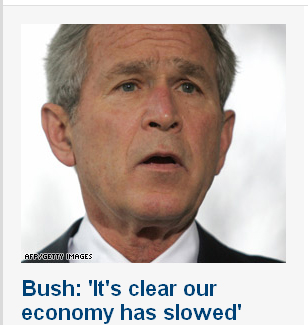Sticks and stones............I don't have the time nor energy to convince you of anything. I know very well and your post proves that what ever I dredge up, you will just discount it. So who the F-ck made you my judge and jury? No one, it's a game which can only be played if I allow it, and I don't - so there.
If you are as well read and intellegent as you see yourself HsvToolFool, then all you have to do is open your eyes and ears. Warning; you may not like what you see and hear, but the truth is just that way sometimes.
Cheers!
Come on, Kach. That kind of tone is really not necessary in a civilized debate. (We are capable of having a civilized debate on this forum, aren't we?) We all have drastically differing opinions on subjects like economics and politics, and we need to be able to express our opinions without disparaging those who hold the opposite opinion. The problem with politics in this nation is that we assume our position is absolutely right and the other side is absolutely wrong, and we will defend that notion with the most caustic rhetoric necessary.
Well, guess what? That's not the way it is. The truth is that both sides are absolutely right, from their own particular point of view. We all come from different backgrounds and view the world from a different perspective. That's why arguing with rhetoric is useless. If you have an opinion on economic or political philosophy, that's great. Share it. But if you are going to make accusations about what the "other side" is doing, then be prepared to be questioned about the source of your facts.
All Brian asked was that you provide a reference to back up your rather broad and damning statements. That's not too much to ask and ultimately, he is right. If you just make those sweeping statements without providing some references to back them up, then you have no credibility in a debate of this nature. And that is the whole idea of a debate like this. To express your thoughts and opinions and the facts on which they are based in the hope of illuminating others about your perspective and learning from others about their own perspective. If we all just said: "Yeah, Bush and Cheney suck!" and patted ourselves on the back with self-righteous glee, then what use is that? What have we learned? Nothing.
Personally, I tend to lean more to the liberal side of things. But I am not so blind as to think that the extreme ends of both parties don't lie through their teeth to achieve their objectives. Extreme left wingers are just as deceitful and treacherous and self-righteous as extreme right wingers, in my experience. In today's world, it is difficult to trust the "facts" spouted by anyone to support their political rhetoric. But in my opinion, there is a hell of a lot more to be gained from having a civilized philosophical debate on the issues that face us, than from just spouting off the same old political rhetoric and calling the other side closed-minded for not buying into it.







